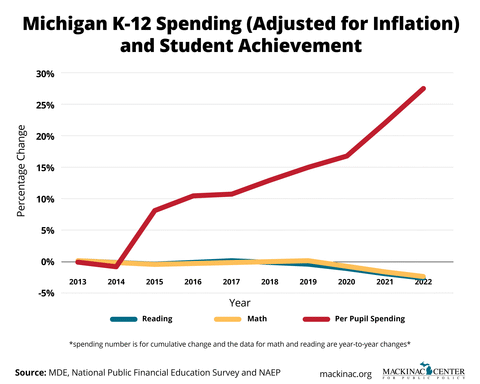Early education may not bring better achievement, study says
‘No discernible long-term effects,’ says researcher
Injecting more money into taxpayer-funded early education centers doesn’t necessarily bring better results, according to a recent study from the University of Virginia.
Over the past 10 years, numerous public school districts in Michigan have asked taxpayers to permission to borrow money for new preschool centers.
School leaders and taxpayers alike may be disappointed with how things turn out, however. “Preschool programs have long been hailed as effective interventions, yet our study reveals a more nuanced reality,” said Margaret Burchinal, a research professor at the University of Virginia’s Center for Advanced Study of Teaching and Learning
“While many presume their positive impact, rigorous evaluations show a mix of outcomes, including both successes and setbacks and, in some cases, no discernible long-term effects. It's imperative that we design preschool programs to uniformly promote school success, especially for children from families with low income."
More research is required, Jade Jenkins, an assistant professor at the University of California-Irvine School of Education, told CapCon in an email. ”We need to get into details within the model about what makes early education work best,” said Jenkins, who is a co-author of the study.
In Michigan, St. Johns Community Schools put forth a bond proposal in the May 2024 election for a new early education center, with cost estimates ranging from $16 million to $20 million.
Voters rejected the proposal, though the district plans to ask voters again, according to emails Michigan Capitol Confidential obtained through an open records request.
School leaders continue to spend millions on expanding preschool programs despite meager evidence that they work, said Christian Barnard, assistant director of education reform at the Reason Foundation.
“It’s unwise to divert scarce resources toward expensive early childhood programs that are ineffective and that aren’t very popular among families,” Barnard wrote in an email to CapCon.
Academic performance in the state has been stagnant since at least 2013, despite increased spending.
In the graph below, the red line shows the percentage change in K-12 state spending, and the other lines show the percentage change in reading and math performance on the NAEP (often dubbed “the nation’s report card”) since 2013. The spending number is for cumulative change and the data for math and reading represent year-to-year changes.
The Annie E. Casey Foundation ranked Michigan at 41st in the nation for education outcomes in a June 2024 report. Three out of four (72%) fourth graders in the state are not proficient in reading. Eighth graders fared worse, with 75% of eighth graders not proficient.
Yet Michigan is among the five states with the highest percentage of early education benchmarks met, according to Simple K12, a teacher-training organization. It evaluated states using a report from the National Institute for Early Education Research.
Supporting children’s development is essential Rep. Jaime Greene, R-Richmond, minority vice chair of the House Education Committee, said in an email to Michigan Capitol Confidential. But, she said, we should scrutinize the emphasis on early education.
“Research has shown mixed results, at best, when it comes to the long-term impact of large-scale early education programs,” Greene said.
“For many children, early literacy and social skills flourish best in home and play-based environments, not in formalized settings,” Greene wrote. “Rather than pushing for uniform early education, we need to support parents as the primary educators in those formative years, allowing young children the play and exploration foundational to literacy and learning success.”
This is the second in a series that explores the growth of government-based early childhood education programs.
Michigan Capitol Confidential is the news source produced by the Mackinac Center for Public Policy. Michigan Capitol Confidential reports with a free-market news perspective.



 Michigan pushes $762M pre-K expansion while K-12 performance declines
Michigan pushes $762M pre-K expansion while K-12 performance declines
 Michigan spends $6.9M advertising 'cost-free' pre-K
Michigan spends $6.9M advertising 'cost-free' pre-K
 State’s early education plan could shutter private child care
State’s early education plan could shutter private child care

 Taxes matter to Michigan’s population growth
Taxes matter to Michigan’s population growth
 If you seek a pleasant peninsula, U-Haul will take you to Florida
If you seek a pleasant peninsula, U-Haul will take you to Florida
 Rural Michigan counties saw most population growth in 2022
Rural Michigan counties saw most population growth in 2022